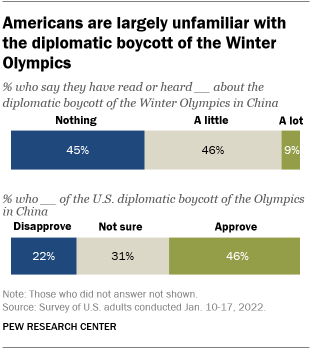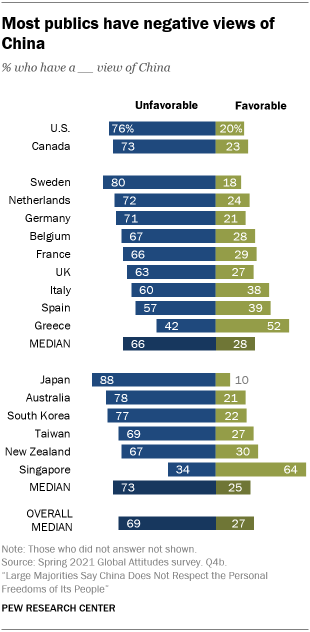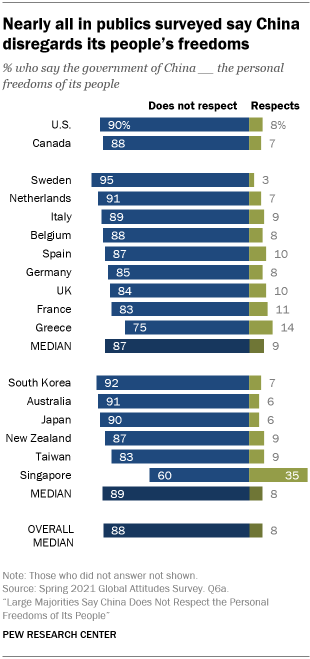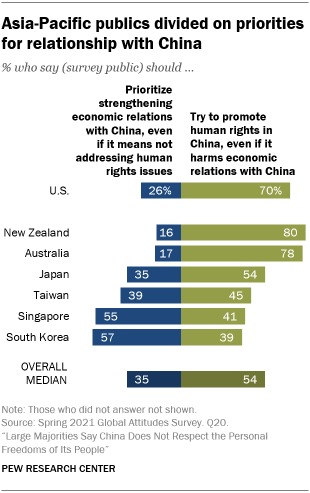
The Biden administration is moving ahead with a diplomatic boycott of the 2022 Beijing Winter Olympics, citing human rights concerns regarding China’s treatment of Uyghurs in the country’s Xinjiang region. Shortly after the White House announced its boycott of the Games in December, leaders from the United Kingdom, Canada, Australia and Japan announced that their governments would also decline to send high-level officials to Beijing.
With the 2022 Winter Olympics set to begin, here’s a summary of recent Pew Research Center survey data about Americans’ views of the diplomatic boycott, as well as how people in the United States and around the world see China more broadly:
- According to a recent survey, 45% of U.S. adults say they have not read or heard anything about the Biden administration’s plans for a diplomatic boycott of the Winter Olympics. About the same share (46%) say they have read or heard “a little” about the boycott and only 9% say they have read or heard “a lot.”
- Despite its low profile among the American public, views of the boycott are relatively positive: Nearly half (46%) of Americans approve of the decision to hold a diplomatic boycott of the Winter Olympics, compared with 22% who disapprove. About three-in-ten Americans are not sure.
- Confidence in President Joe Biden’s handling of relations with China has fallen over the past year. Just 39% of Americans today have confidence in Biden’s ability to deal effectively with China, down from 53% in early 2021.
- Most of the 17 global publics surveyed by the Center in 2021 had a negative view of China. Unfavorable views were highest in Japan, where nearly nine-in-ten adults (88%) said they had an unfavorable opinion. In many publics, unfavorable views of China were at or near historic highs in surveys going back to 2002.
- Majorities in each of the international publics surveyed in 2021 said China does not respect the personal freedoms of its people. Again, the shares holding this opinion were at or near record highs in most places where the question had been asked before. Even in Singapore, where 64% of adults expressed a positive view of China, 60% said China does not respect the personal freedoms of its people.
- Chinese President Xi Jinping drew negative reviews from nearly every public surveyed in 2021. Majorities in every surveyed place but Singapore said they had no confidence in Xi to do the right thing regarding world affairs.
- Asia-Pacific publics were divided in 2021 over whether to prioritize economic relations with China or promote human rights there instead. Majorities in New Zealand and Australia said their country should try to promote human rights in China, even if it harms economic relations. In Singapore and South Korea, by contrast, majorities favored strengthening economic relations, even if it means not addressing human rights issues. Japanese and Taiwanese adults were more evenly divided on the question.
- When asked what comes to mind when they think of China, Americans frequently brought up human rights in an open-ended survey question in February 2021. Mentions of human rights came up in 20% of responses, and 3% specifically focused on the treatment of Uyghurs in Xinjiang.
- Between 2020 and 2021, Americans in both parties expressed growing concern about China’s policies on human rights. More than half of Democrats and Democratic-leaning independents (54%) said in 2021 that China’s human rights policies would be a very serious problem for the U.S., up from 45% who said this in 2020. The share of Republicans and GOP leaners with this view also rose from 41% in 2020 to 49% a year later.
- The level of government restrictions on religion in China have been classified as “very high” every year since 2007, according to an annual Center study of such restrictions around the world. In 2019, the most recent year for which data is available, various sources estimated that more than a million people were arbitrarily detained by government authorities and subjected to human rights violations in the Xinjiang region.




